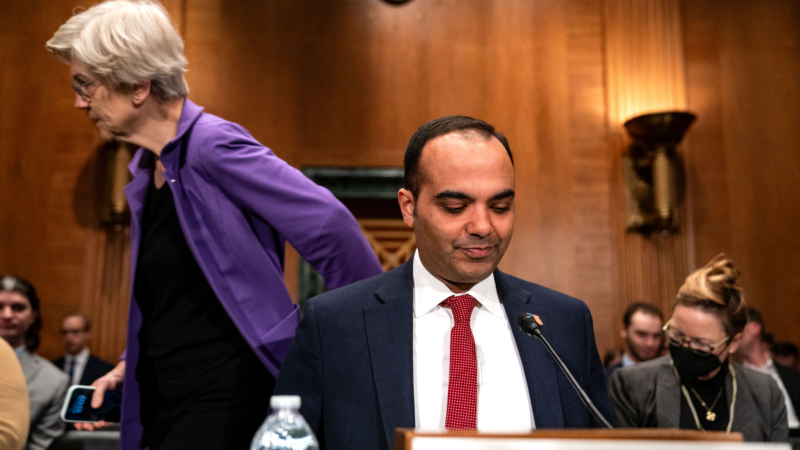CFPB sues Berkshire Hathaway-owned mortgage lender for alleged predatory practices
The U.S. Consumer Financial Protection Bureau said Monday that it is suing a Tennessee-based mortgage lender owned by Berkshire Hathaway, accusing the company of predatory practices aimed at steering borrowers into manufactured homes they could not afford.
The CFPB said that Vanderbilt Mortgage & Finance often disregarded evidence that borrowers could not afford the loans. Vanderbilt is a subsidiary of Clayton Homes, the largest U.S. producer of manufactured homes, which in turn is a subsidiary of Warren Buffett’s holding company, Berkshire Hathaway.
“Vanderbilt knowingly traps people in risky loans in order to close the deal on selling a manufactured home,” CFPB Director Rohit Chopra said in an statement. “The CFPB’s lawsuit seeks to not only protect homebuyers, but also honest lenders helping people to finance the purchase of an affordable home.”
Reached for comment by NPR, a strategic firm representing Vanderbilt said the CFPB’s lawsuit “is unfounded and untrue, and is the latest example of politically motivated, regulatory overreach.”
“Vanderbilt Mortgage’s underwriting processes exceed the legal requirements for assessing a borrower’s ability to repay loans by considering both monthly debt-to-income ratio and residual income,” it said. “Vanderbilt Mortgage goes further by taking the greater of the borrower’s actual reported expenses or an estimated living expense for the family size, similar to that used by the Federal VA loan program.”
CFPB said that Vanderbilt manipulated its own lending standards when borrowers did not have sufficient income to obtain a mortgage. It said the company used “artificially low estimates of living expenses” to approve borrowers who wouldn’t otherwise qualify. In one case, it “approved a loan for a family with 33 debts in collection and two young children. The borrowers fell behind only eight months after getting the mortgage,” the watchdog agency said.
In addition, the CFPB said that when potential buyers could not meet Vanderbilt’s own “overly optimistic estimates” of their ability to repay, the company still approved them in some cases. In one instance, Vanderbilt issued a mortgage to “a single mother with two dependents after estimating she had insufficient income, and then sent her loan to collections when she missed a mortgage payment after only four months in the home,” CFPB said.
Mike Calhoun, president of Center for Responsible Lending, a nonpartisan nonprofit that promotes fairness in financial practices, says Vanderbilt has been on the organization’s radar for a number of years.
Calhoun says interest rates on loans made for manufactured housing are typically 50% higher than for other types of housing.
These loans, he says, “are issued to the most vulnerable home buyers out there and these people are already faced with a number of tough [financial] headwinds” because of their typically lower incomes.
According to the Manufactured Housing Institute, a trade organization, the median household income in 2022 for buyers of manufactured homes was $35,000. Nearly 113,000 such homes were produced in that year, representing about 11% of all new home starts. The average sales price of a manufactured home was $127,250 without land.
A 2016 report by the Center for Public Integrity cited Clayton Homes for lending at interest rates of 15% or more while tacking on thousands of dollars in additional loan fees. It also said that former Clayton dealers reported that the company “encouraged them to steer buyers to finance with Clayton’s own high-interest lenders.”
At a Berkshire Hathaway annual shareholder meeting in 2015, Buffett defended the lending practices of Clayton Homes, saying he had “no apologies whatsoever” for the way the company issued loans, according to Reuters.
Why some are accusing Trump of manipulating stock markets
Senators Adam Schiff and Ruben Gallego have asked for "an urgent inquiry" into whether President Trump or others engaged in insider trading on advanced knowledge of his tariff policy changes.
Supreme Court says Trump officials should help return wrongly deported Maryland man
The Supreme Court ordered the administration to "facilitate" the return of Kilmar Armando Abrego Garcia, who was mistakenly taken to El Salvador and remains in custody there.
15 hours later, a grueling ER shifts ends in ‘The Pitt’ season finale
The first season of The Pitt focused on the toll that work takes on doctors and nurses. It's also been a stellar season of TV.
HHS will review guidance on the addition of fluoride to drinking water
HHS Secretary Robert F. Kennedy Jr. has blamed the addition of fluoride — a common, naturally occurring mineral — for a host of health issues. The CDC says the policy has reduced cavities by some 25%.
Trump administration lays out its evidence for deporting activist Mahmoud Khalil
Khalil's attorneys say the government's case against their client largely rests on a single letter from Secretary of State Marco Rubio alleging that Khalil participated in "antisemitic" and "disruptive activities."
The Northeast bet big on offshore wind. Trump wants to halt the industry entirely
Northeast states have bet big on offshore wind to meet spiking power demand and drive economic growth. But the industry's future is much more uncertain under President Trump.









